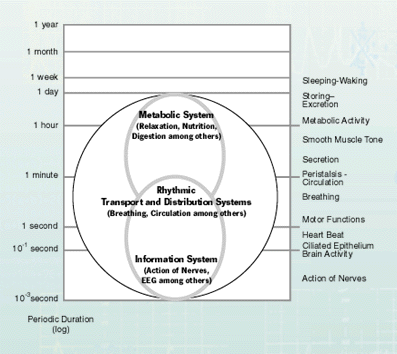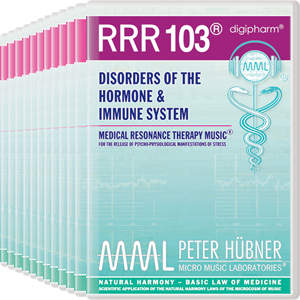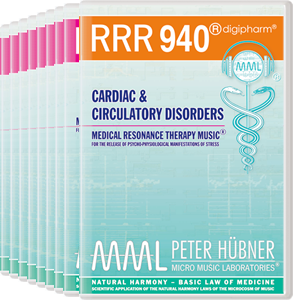|
Scientific Music Medicine |
| Home • Site Map • Research • Reports • Intern. Experts • Music Preparations • Fundamentals • Store • Contact |

Prof. Dr. med. Gunther Hildebrandt • Chronobiological Aspects of Music Physiology
The shorter wave rhythms of the spectrum, however, (illustration 1, underneath the day rhythm) are purely endogenous autonomic functional variations which have no immediate link to the rhythms of the environment. Instead, a special organizational principle shows itself in this area (illustration 6): So you find the highest frequency rhythmic processes in the area of the nervous system. They serve here to change information, i.e. for the absorption, transportation and processing of information which is encoded into rhythmic signals.
The slow rhythms of the autonomic area, however, primarily serve the metabolism and its functional areas. They regulate the intake and excretion of substances, digestion, secretion and energy storage.
While the informational rhythms are strictly bound to highly differentiated spatial structures of the nervous system, the metabolic rhythms more or less concern all tissue and are spatially much less specified. The system of the rhythmic functions of transportation and distribution is the transition between these two completely different functional areas, especially with the rhythms of circulation and breathing.
The slow rhythms of the autonomic area, however, primarily serve the metabolism and its functional areas. They regulate the intake and excretion of substances, digestion, secretion and energy storage.
While the informational rhythms are strictly bound to highly differentiated spatial structures of the nervous system, the metabolic rhythms more or less concern all tissue and are spatially much less specified. The system of the rhythmic functions of transportation and distribution is the transition between these two completely different functional areas, especially with the rhythms of circulation and breathing.

Illustration 6
The three-way structure of the rhythmic functions in the autonomic area with periodic duration underneath the day.
(Further details see in the text.)
(According to HILDEBRANDT 1986)
The three-way structure of the rhythmic functions in the autonomic area with periodic duration underneath the day.
(Further details see in the text.)
(According to HILDEBRANDT 1986)
| MEDICAL RESONANCE THERAPY MUSIC® Medical Music Preparations on CD |
| Listening Program:
Disorders of the Hormone & Immune System 
Listening Program: Cardiac & Circulatory Disorders 
|
|
If you like to look at the complete program, |
With kind permission of AAR EDITION INTERNATIONAL
© 1998- SCIENTIFIC MUSIC MEDICINE | Contact
Subject to change in the interests of scientific advancement.
© 1998- SCIENTIFIC MUSIC MEDICINE | Contact
Subject to change in the interests of scientific advancement.